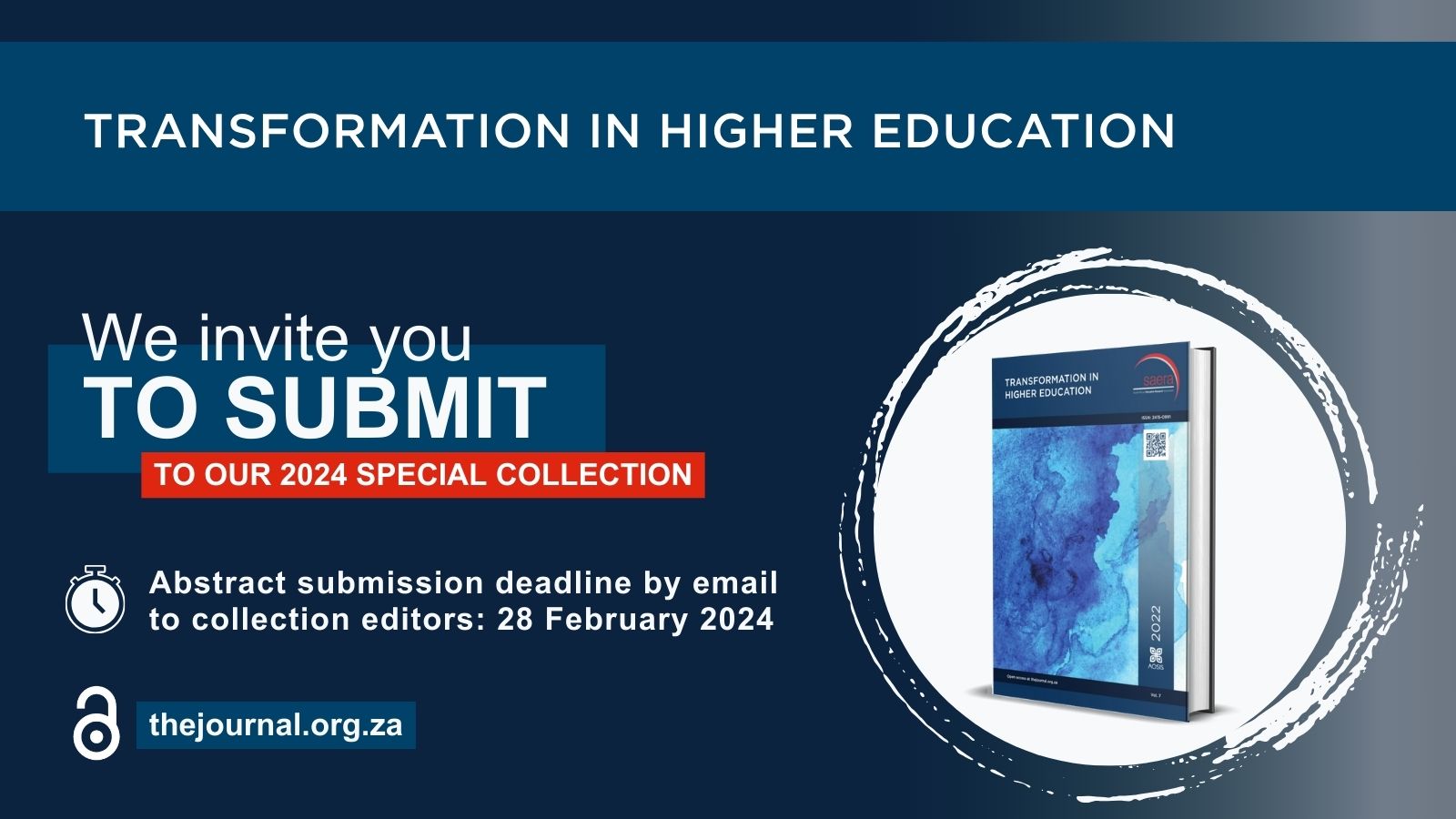Transformation in Higher Education 2024 special collection: We invite you to submit

Transformation in Higher Education 2024 special collection: We invite you to submit
AOSIS calls on all authors to participate in the 2024 special collection that will be published in the open-access scholarly journal Transformation in Higher Education. Submit your latest research for consideration, contribute to the open-access content available to everyone, and share your expertise with a wider audience.
Timelines:
- Abstract submission deadline by email to collection editors: 28 February 2024
- Manuscript submission deadline on the journal website: 30 April 2024
- Expected publication date: 29 November 2024
We would be honoured to receive your positive reply and look forward to receiving your manuscript.
The neoliberal turn in higher education: Pitfalls, Challenges, and Possibilities in the Global South
Since at least the 1960s/1970s, higher education institutions have been battling systemic cuts in government subsidies and support while they are forced to respond to the ever-growing student enrolment and massification in the sector (Kezar, DePaola, & Scott, 2019; Shore, 2010; Whyte, 2019). Primarily driven by the neoliberal (and colonizing) logics of performance management, productivity, quality assurance and efficiency and the publish or perish discourse (Darder, 2012; del Cerro Santamaría, 2020; Mintz, 2021) – the neoliberal turn in higher education appears firmly entrenched and institutionalized in the university. This results in the social construction of students as fee-paying clients who have bought and paid for the curriculum goods of the university, with academics becoming the scholars in the marketplace who are selling the curriculum knowledge. This commodification, commercialisation, corporatization, and corruption of the public good of higher education need to be challenged. Equally more troubling for us is how the public university in the global South is obsessed with the rankings, ratings, grants, and subsidies with real and material implications for the quality of research, teaching and learning, community engagements, university institutional culture(s), and the mental health and wellbeing of academics, students, and the support staff.
In this special issue, we attempt to do two things. Firstly, we seek to explore/ explicate/ theorise the emergent neoliberal university, and its damaging logics and discourses in the global South. Secondly, we attempt to re-think/ reimagine/ re-evaluate the public university beyond neoliberalism, calling for papers that push us to reconsider what an inclusive, democratic, and socially just university could potentially look like. We especially call for papers that offer solid theoretical and philosophical critique at the neoliberal university, and those that attempt to push us to reimagine the alternative and the counter-hegemonic. We welcome papers drawing on diverse theoretical, philosophical, and ideological orientations to formulate interventions.
Full papers on any topic related to this theme may be submitted. These topics include (but are not limited to) the following:
- The historical/philosophical foundations of the neoliberal university.
- Teaching, learning in/beyond the neoliberal university.
- Assessment in/beyond the neoliberal university.
- Students’ well-being in/beyond the neoliberal university.
- Student leadership in/beyond the neoliberal university.
- Performance management regimes/instruments.
- Leading in/beyond the neoliberal university.
- Academic staff development in/beyond the neoliberal university.
- Curriculum thinking/module design.
- Queer beings/bodies in/beyond the neoliberal university.
- Decolonial/Afrocentric struggles in/beyond the neoliberal university.
- Early career academics’ experiences/voices in/ beyond the neoliberal university.
- Workers/student alliances in/beyond the neoliberal university.
Manuscript information
Manuscript contributions may consist of the following:
- Manuscript submissions should be in English.
- Original Research articles must fully comply with journal guidelines for manuscripts (maximum 6000 words, 60 or fewer references with limited self-referencing; no more than one or less table/Figures).
- Manuscripts must fully comply with the journal guidelines for manuscripts.
- Interested authors must consult the journal’s procedures for manuscript submissions.
Submission procedure
Submit abstracts for consideration to the collection editors by email before 28 February 2024 (mhlatshwayo@uj.ac.za and tmvulanemoloi@uj.ac.za). If the collection editors approve your abstract, submit it as below:
To submit your manuscript to Transformation in Higher Education, please visit thejournal.org.za and log in with your personal user credentials. When you submit the manuscript, select ‘The neoliberal turn in higher education ’ as the article type. All submissions will undergo anonymous review to guarantee high scientific quality and relevance to the subject. The final decision regarding acceptance/revision/rejection will be based on the reviews received from the reviewers and at the sole discretion of the Editor-in-Chief.
All inquiries should be directed to the attention of:
- Prof. Mlamuli Hlatshwayo, Ali Mazrui Centre for Higher Education Studies, University of Johannesburg: mhlatshwayo@uj.ac.za
- Dr. Tshepo Mvulane Moloi: tmvulanemoloi@uj.ac.za
About AOSIS Scholarly Journals
Maximise journal impact through open access, expert publishing services, quality peer reviews, and cost-effective production. You can browse the AOSIS open-access journal collection per scholarly field and browse by keyword or per author at library.aosis.co.za. All our open-access content is free and available to everyone upon publication. A physical copy can be purchased at the AOSIS Shop.
Open access publishing
We are an open-access publisher, meaning all content is freely available without charge to the reader. Readers are allowed to read, download, copy, distribute, print, search, or link to the full texts of the books or use them for any other lawful purpose without asking prior permission from the publisher or the author, provided that the work is appropriately cited.
